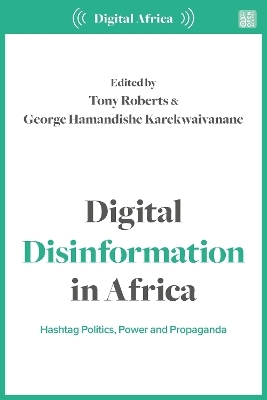
Digital Disinformation in Africa
Zed Books Ltd (Verlag)
978-1-350-31920-2 (ISBN)
Drawing on scholars from across the continent, case studies document the actors and mechanisms used to profile citizens, manipulate beliefs and behaviour, and close the political space for democratic dialogue and policy debate. Chapters include examinations of how the Nigerian government deployed disinformation when the #EndSARS campaign focused attention on police brutality and corruption; insights into how pro-government actors responded to the viral #ZimbabweanLivesMatter campaign; and how misogynists mobilized against the #AmINext campaign against gender-based violence in South Africa.
Through the documentation of episodes of unruly politics in digital spaces, these studies provide a valuable assessment of the implications of these dynamics for digital rights, moving beyond a focus on elaborations of the idea of ‘fake news’, and providing actionable recommendations in the areas of policy, legislation and practice.
The ebook editions of this book are available open access under a CC BY-NC-ND 4.0 licence on bloomsburycollections.com.
George Karekwaivanane is a Lecturer in African Studies at the University of Edinburgh, UK. His publications include The Struggle over Power in Zimbabwe: Law and Politics since 1950, along with three other edited collections. Tony Roberts is a Fellow at the Institute of Development Studies (IDS) at the University of Sussex, UK. A digital development practitioner since 1988, he founded and led two international development agencies including Computer Aid International. He is currently the Principal Investigator on the GCRF-UKRI-funded African Digital Rights Network.
1. Digital Disinformation in Africa: A Critical Approach
Tony Roberts and George Hamandishe Karekwaivanane
2. Digital Gendered Disinformation and Women’s Civic Participation in Africa
Nkem Agunwa
3. Disinformation on a Shoestring: Examining the Anatomy and Strategies of the Pro-State Network in the Zimbabwean Twitterverse
George Hamandishe Karekwaivanane
4. Disinformation, Social Media Networks and Terrorism in Mozambique: Narratives, Strategies and Practices
Dércio Tsandzana
5. On Selfies and Hashtags: Disinformation during Armed Conflict in Ethiopia
Yohannes Eneyew Ayalew and Atnaf Berhane Ayalew
6. (Re)Writing History: Discursive Practices of Gukurahundi Disinformation on Twitter
Rutendo Chabikwa
7. Are Claims of Russian Disinformation in Africa Founded? Elections in Zimbabwe, South Africa, and the Democratic Republic of the Congo
SeYoung Jeon
8. Digital Disinformation in Cameroon's 2018 Presidential Election
Simone Toussi
9. Disinformation in Uganda’s 2021 Elections
Juliet Nanfuka
10. Online Disinformation and Memefication in Angola’s 2022 election
Edmilson Angelo
15. "Anyone can be a mercenary”: Disinformation and Kenyan News Media in the 2022 General Election
Wambui Wamunyu
Bibliography
Index
| Erscheinungsdatum | 06.04.2024 |
|---|---|
| Reihe/Serie | Digital Africa |
| Sprache | englisch |
| Maße | 156 x 234 mm |
| Themenwelt | Mathematik / Informatik ► Informatik |
| Sozialwissenschaften ► Kommunikation / Medien ► Journalistik | |
| Sozialwissenschaften ► Kommunikation / Medien ► Medienwissenschaft | |
| Sozialwissenschaften ► Politik / Verwaltung | |
| Wirtschaft | |
| ISBN-10 | 1-350-31920-1 / 1350319201 |
| ISBN-13 | 978-1-350-31920-2 / 9781350319202 |
| Zustand | Neuware |
| Haben Sie eine Frage zum Produkt? |
aus dem Bereich


